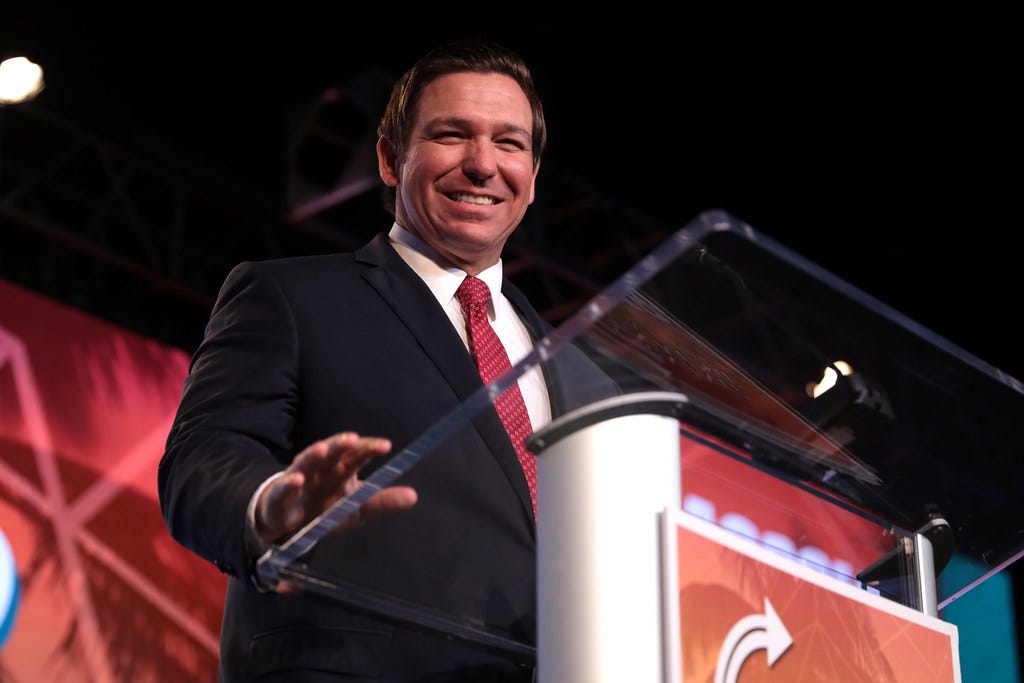As a new session begins, don't watch what Ron DeSantis says. Watch what Ron DeSantis does.
The Trade Show (2023 ed.), Vol. 7

This is “The Trade Show,” a weekly collection of shorter news nuggets and stories from other outlets around the state and country about the special interest-driven issues that lawmakers spend most of their time working on. The name comes from something a mentor once told me before I covered my very first session of the Florida Legislature more than 20 years ago: “Ninety percent of what goes on up here is a trade show.” As always, our content here at Seeking Rents is free to all readers. But please consider a paid subscription to support our work, if you can afford one.
I got a small records request back last week from the Florida House of Representatives.
It was fairly modest, as far as public-records requests go: Just 29 emails total. Yet it somehow took the House more than eight months to fulfill it.
Still, these emails included a timely reminder as Florida’s Republican-controlled Legislature prepares to gavel open a new legislative session Tuesday that will likely serve as a launching pad for Gov. Ron DeSantis’ 2024 presidential campaign:
Don’t watch what Ron DeSantis says over the next two months. Watch what Ron DeSantis does.
You may recall that, in the months leading up to the 2022 legislative session, DeSantis made a big deal about how he was going to push the Legislature to pass a gigantic gas-tax cut. Specifically, the governor said he was going to order lawmakers to suspend the state’s gas tax for as long as five or six months.
“Some people said, ‘Why don’t you just do something for a month or two?’” DeSantis said a televised press conference in late November 2021. “And I was like, ‘No, we’ve got to do it longer than that.’ So this’ll be for many months.”
But the public records produced last week by the Florida House show that the governor privately asked lawmakers to do something different — something less helpful for Floridians but more helpful for DeSantis himself.
The records show that, just one week after that televised press conference, the DeSantis administration sent the state House a proposal to cut the gas tax for just one month. Not only that, DeSantis’ office suggested they delay the tax cut until just before last year’s gubernatorial election, when it would be most beneficial to DeSantis’ reelection campaign.
This isn’t breaking news. Tampa Bay Times reporter Lawrence Mower exposed DeSantis’ role in the delayed gas-tax holiday last summer, based on emails obtained from the Florida Senate.
But again, it’s a handy reminder now that the start of the 2023 legislative session is just 48 hours away.
Owning the libs…by handing a tax break to homebuilders
Here’s another example.
At the start of this year, when talk of potential health regulations on gas stoves became the latest outrage-of-the-moment in conservative media, Ron DeSantis made sure to squeeze himself into the story.
First, the Republican governor and impending presidential candidate rushed some campaign aprons onto the market (seriously). Then, more substantively, he pitched a big new tax break for gas stoves — one that would permanently exempt all gas stoves sold in Florida from the state’s sales tax.
Now, whenever DeSantis talks about this idea, he frames it like he is protecting individual Floridians from vast federal overreach.
“They want your gas stoves, and we’re not going to let that happen,” DeSantis said at the Feb. 1 press conference where he first proposed his gas stove tax break.
“They are trying to take away your gas stoves, okay?” DeSantis added at a Feb. 8 press conference promoting his tax plan. “It shows they are coming for any tiny little thing in your life that they can.”

But DeSantis didn’t write this tax break just for folks who want to keep a gas cooktop in their home kitchen. He wrote it for businesses, too.
Nonpartisan state economists say this tax break would cost more than $7 million a year. But they also say one-third of those tax savings would go to businesses that buy commercial gas stoves, like restaurants that install industrial size stoves in their kitchens.
And that may dramatically understate the share of the tax savings that will go to businesses, because this tax break would also apply to homebuilders who buy gas stoves when they’re standing up new subdivisions.
Compare the governor’s gas stove tax break with an existing tax break on “Energy Star”-rated appliances like water heaters, refrigerators and dishwashers. The Energy Star tax break is temporary, but DeSantis wants to extend that for another year, too.
But the governor’s tax plan specifically excludes any Energy Star appliances that are sold for commercial use, which freezes out homebuilders buying them for new homes they plan to sell or restaurants installing them in commercial kitchens. This tax break — which, at least in theory, could help reduce electricity consumption — is strictly for individuals buying new appliances for their homes.
There is no similar limitation in the governor’s gas-stove tax break. When it comes to a tax break that could help sustain the climate-changing gas industry, DeSantis apparently wants it to apply as widely as possible.
Won’t somebody think of the landlords?
This is probably the least surprising piece of legislation in 2023.
After a year in which housing advocates and renters-rights activists made big gains in communities across Florida — from a “Tenant Bill of Rights” in Miami to a law in St. Petersburg that prohibits landlords from refusing to rent to people using housing vouchers — Republicans in the Florida Legislature are poised to step in and undo it all.
Bills introduced last week in Tallahassee would forbid local communities in Florida from regulating any part of “the landlord-tenant relationship” — from setting caps on application fees and security deposits to enacting protections against discrimination, unsafe living conditions, and unfair evictions.

These bills — HB 1417 sponsored by Rep. Tiffany Esposito (R-Fort Myers) and SB 1586 by Sen. Jay Trumbull (R-Panama City) — would throw a couple of crumbs at renters. They would require landlords to give tenants at least 60 days’ notice if they want the tenant to leave at the end of a rental agreement (current law only requires up to 60 days’ notice) and 30 days’ notice if the tenant is renting month-to-month (up from 15 days).
But it’s mostly a gift for landlords, who are such an influential lobbying force in Tallahassee that they once persuaded the Legislature to block protections for members of the U.S. military.
In case you were wondering, the Florida Apartment Association — the main lobbying group for landlords — gave more than $100,000 to Florida politicians last month.
That included $25,000 to committees run by House Speaker Paul Renner (R-Palm Coast) and $15,000 to a committee run by Senate President Kathleen Passidomo (R-Naples).
Business lobbyists have good ideas, too!
Lobbyists representing retailers like Walmart, Home Depot, Outback and Olive Garden want Florida lawmakers to cut the swipe fees charged by credit-card processors like Visa and Mastercard.
Retailers pay swipe every time you buy something with a credit or debit card, and they’re a big profit center for the credit-card companies. Technically known as an “interchange fee,” the average swipe fee is between 1.5 percent and 3.5 percent of the transaction price, according to Bankrate.com. And it applies to the total amount — including tax.

So the Florida Retail Federation and the Florida Restaurant & Lodging Association are teaming up to lobby for bills that would force Visa, Mastercard and other card processors to exclude sales and hotel taxes when they calculate interchange fees. It apparently adds up to nearly $300 million a year in fees, according to the restaurant and lodging association.
The bills are HB 677, sponsored by Rep. Mike Caruso (R-Delray Beach) and SB 564 by Sen. Travis Hutson (R-Palm Coast). Records show that major retailers like Home Depot, RaceTrac and Walgreens are lobbied up on them. But it’s also a safe bet that Visa, Mastercard and financial industry front groups are fighting it hard behind the scenes.
This is a good idea — although it would be even better if there was some assurance that any of the savings would make their way to consumers rather than being gobbled up as extra margin for the retailers.
Maybe that’s a discussion that can be had…if the bill ever gets a hearing.
Helping billionaire team owners squeeze their minor league ballplayers
One bill that definitely will get a hearing is an effort by Major League Baseball’s billionaire team owners to cut minor league baseball players off from Florida’s minimum wage.
The Senate version of the bill — SB 892, sponsored by Sen. Jonathan Martin (R-Fort Myers) — will be taken up Monday afternoon by the Senate Commerce and Tourism Committee, which meets at 3:30 p.m.

MLB started lobbying for this legislation after a federal judge ruled against the league in a lawsuit where it tried to claim that minor leaguers were already exempt from Florida’s minimum wage law.
MLB ultimately paid $185 million to settle that suit. But now the league and its 30 team owners — who have historically refused to pay players at all during periods like spring training and who still pay some minor leaguers less than $5,000 a year — want Gov. Ron DeSantis and the Legislature to shield them against any future minimum wage claims.
But what makes the bill especially ugly is that it would also undercut minor leaguers just as they are trying to negotiate a labor contract through a new union they formed last fall.
Passing this bill right now and lowering players’ potential wage floor would give MLB even more leverage to squeeze out concessions during those contract talks.
A bunch of journalists have been doing some great work around this issue — including public-radio’s Marketplace, whose podcast, “The Uncertain Hour,” did a deep-dive into labor loopholes exploited by professional baseball, and independent journalist Marc Normandin, who writes an in-depth MLB labor newsletter.
Listen: Inside baseball: In minor league baseball, athletes train, suit up and play for wages that would be illegal in most sectors. (The Uncertain Hour)
And once you’re done with that podcast, check out a three-part series The Uncertain Hour did about the evolution (devolution?) of what it means to be an employee in the United States of America.
Listen: Congratulations! You’re an entrepreneur now (The Uncertain Hour)
Listen: Who’s the boss? (The Uncertain Hour)
Listen: “To suffer or permit to work” (The Uncertain Hour)
Radioactive roads
This will be one of the more interesting special-interest bills to watch this session: Mosaic Co., the industrial giant that strip-mines phosphate rock and turns it into fertilizer at chemical plants in central Florida, is lobbying for a bill that could allow a radioactive byproduct produced in its manufacturing process to be used in road construction.
Read: Bills would allow radioactive byproducts of phosphate mining in road bed test projects (WUSF)
How a bill (doesn’t) become law
Property insurance has been one of the most important economic stories in Florida for at least the past year, and no journalist in Florida is doing better work in this area than Lawrence Mower of the Tampa Bay Times.
His latest will leave you infuriated. Again.
Read: Was the solution to Florida’s insurance crisis found 15 years ago? (Tampa Bay Times)
‘The most compliant Legislature in recent memory’
Speaking of the Tampa Bay Times, they always do the best session previews in the business. Here’s this year’s:
Read: DeSantis’ sway over Florida Legislature unprecedented ahead of 2024 bid (Tampa Bay Times)
Slow-playing public records
Last one of this week: In an administration where top advisors use secret pseudonym emails and the governor himself avoids electronic communications, Mike DeForest of News 6 in Orlando discovered another way that Ron DeSantis has his staff slow play responses to public-records requests.
Read: DeSantis ‘review’ of public records can add months of delays, newly uncovered log reveals (WKMG)



